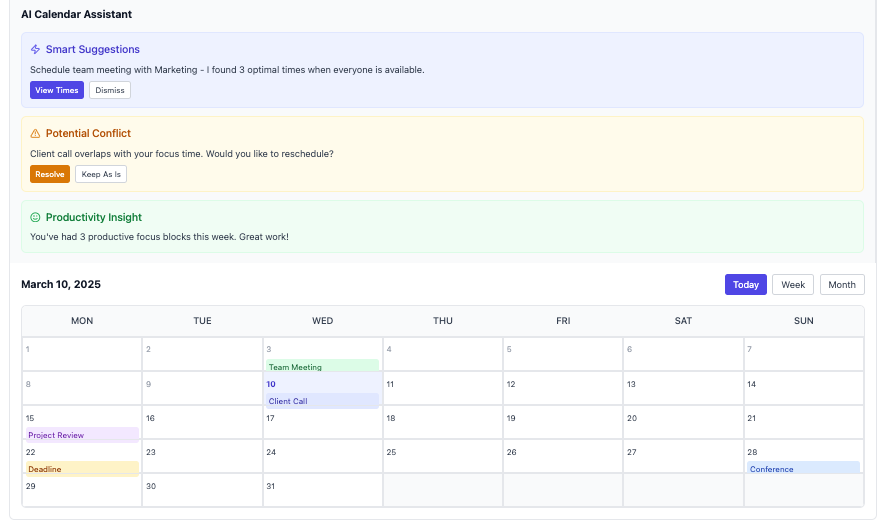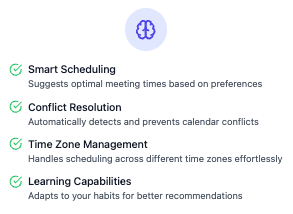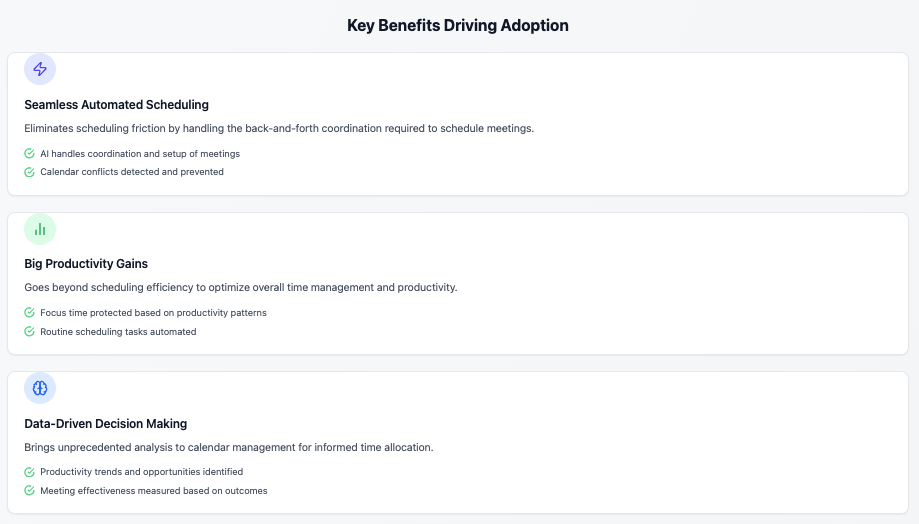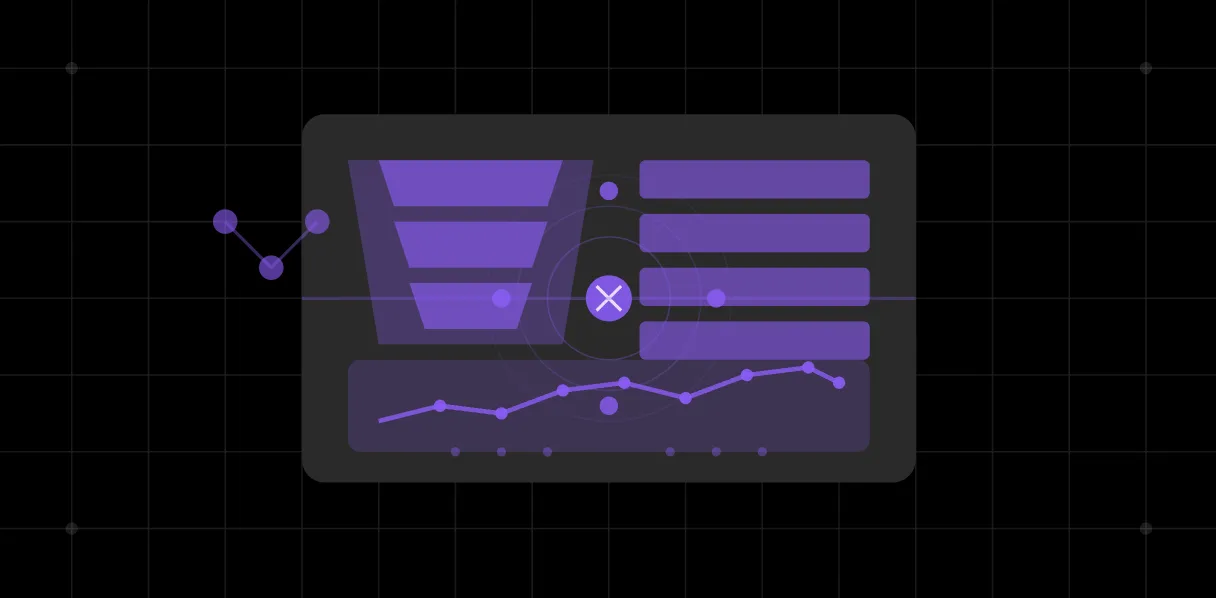Streamline Your Calendar Management with AI Automation: The Best Tools
Streamline Your Calendar Management with AI Automation: The Future of Time Management
In today’s fast paced business world, time management is no longer a personal virtue – it’s a competitive advantage. As professionals juggle multiple responsibilities, meetings and deadlines, traditional calendar management is no longer cutting it. Artificial intelligence, particularly through the use of an AI assistant, is now changing this fundamental aspect of workplace productivity by enhancing productivity and simplifying task management, offering solutions that go beyond scheduling to create intelligent time management systems.

The Evolution of Calendars
Calendars have evolved from paper planners to digital calendars and now to AI powered scheduling assistants. This is more than just technological progress – it’s a fundamental shift in how we think and optimise our most valuable resource – time. AI calendars are not just digital versions of traditional calendars – they are intelligent systems that learn, adapt and proactively manage time commitments.
What is an AI Scheduling Assistant?
Definition and Explanation
An AI scheduling assistant is a sophisticated software tool designed to revolutionize the scheduling process by leveraging artificial intelligence. These assistants streamline the task of scheduling meetings, appointments, and tasks, making time management more efficient for both individuals and teams. By integrating seamlessly with various calendar platforms, including Google Calendar, AI scheduling assistants can learn users’ preferences and adapt to their unique schedules. This intelligent approach to scheduling not only saves time but also reduces the cognitive load associated with managing multiple commitments.

How AI Scheduling Assistants Work
AI scheduling assistants operate using advanced machine learning algorithms that analyze users’ calendars, preferences, and habits. By understanding these patterns, the assistants can suggest optimal meeting times and schedules that align with users’ productivity rhythms. They automatically adjust for different time zones, handle rescheduling and cancellations with ease, and provide real-time updates to keep everyone informed. Over time, these assistants become more accurate and efficient, continuously improving their suggestions based on user interactions and feedback.
Benefits of Using an AI Scheduling Assistant
The benefits of using an AI scheduling assistant are manifold. By automating routine tasks and minimizing scheduling conflicts, these tools save valuable time and reduce stress. They enhance productivity by providing a clear plan of action and helping users prioritize their tasks effectively. For teams, AI scheduling assistants streamline planning and coordination, ensuring that everyone stays organized and focused. This leads to more efficient meetings, better time management, and ultimately, a more productive work environment.
Understanding AI Scheduling Technology
Key Features of AI Schedule Makers
AI schedule makers come equipped with a range of key features designed to provide a seamless and efficient scheduling experience:
-
Integration with Various Calendar Platforms: AI schedule makers can sync with popular calendar platforms like Google Calendar, ensuring all your appointments and tasks are in one place.
-
Automatic Scheduling and Rescheduling: These tools handle the entire scheduling process, from setting up initial meetings to rescheduling when conflicts arise.
-
Real-Time Updates and Automated Conflict Resolution: Users receive instant updates on any changes, and the system automatically resolves scheduling conflicts.
-
Machine Learning Algorithms: AI schedule makers learn from users’ preferences and habits, adapting to provide more accurate and personalized scheduling suggestions.
-
Multi-Time Zone and Language Support: They can manage schedules across different time zones and languages, making them ideal for global teams.
-
User-Friendly Interface and Easy Setup: Designed with the user in mind, these tools are easy to set up and navigate.
-
Customizable Settings and Preferences: Users can tailor the scheduling assistant to fit their specific needs and preferences.
-
Integration with Other AI Tools and Apps: AI schedule makers can work in conjunction with other productivity tools, creating a cohesive and efficient workflow.
These features collectively ensure that AI schedule makers not only save time but also reduce the stress associated with managing complex schedules, making them an invaluable tool in today’s fast-paced business environment.

Key Benefits Driving Adoption
Seamless Automated Scheduling with AI Scheduling Assistants
The biggest benefit of AI calendar management is the elimination of scheduling friction:
-
AI assistants handle the back and forth coordination required to schedule meetings
-
AI tools streamline the process of meeting scheduling by automating the setup of meetings, reducing administrative burden
-
Calendar conflicts are detected and prevented before they happen
-
Scheduling preferences are learned and applied consistently across all appointments
-
Meeting types are recognised and time blocks are allocated accordingly
This reduces the cognitive load of calendar management, freeing up mental energy for more strategic activities.
Big Productivity Gains
The productivity impact of AI calendar management goes far beyond scheduling efficiency: AI scheduling tools act as a personal assistant, optimizing users’ productivity by adapting to their preferences and managing various aspects of their lives.
-
Routine scheduling tasks that used to take hours a week are automated
-
Focus time is protected and optimised based on personal productivity patterns
-
Context switching is minimised by grouping similar activities together
-
Meeting preparation time is built into schedules based on complexity and importance
These gains add up over time and create huge value for individuals and organisations.
Data Driven Decision Making for Meeting Scheduling
AI brings unprecedented analysis to calendar management:
-
Scheduling patterns are analysed to identify productivity trends and opportunities
-
Meeting effectiveness is measured based on outcomes and participant feedback
-
Time is allocated across different activities and priorities
-
Resource utilisation (including the most valuable resource – human attention) is maximised
These insights enable more informed decisions on how time is invested, individually and organisationally. Additionally, AI technology schedules meetings by optimizing appointment times based on user preferences, making the scheduling process more efficient and tailored to individual needs.
Almost Error Free
AI-driven scheduling tools introduce significant advantages by reducing human error and managing time across different time zones. Human scheduling introduces errors that create cascading disruptions. AI minimises these:
-
Double booking becomes almost impossible with real time calendar sync
-
Time zone calculations are handled automatically without manual conversions
-
Buffer time is intelligently added to prevent meeting overruns and scheduling compression
-
Changes and cancellations are propagated across all affected calendars
This reduces errors and administrative overhead of calendar management.
Personalised Time Optimisation
AI is great at tailoring scheduling to individual preferences and productivity patterns:
-
Personal productivity rhythms inform meeting and focus time scheduling
-
Individual preferences for meeting frequency, duration and timing are applied automatically
-
Energy management is included through scheduling of high-cognitive tasks
-
Work-life boundaries are respected through customised availability settings
This means calendars work for people, not people for their calendars.
Continuous Availability and Support
AI calendar systems go beyond traditional availability limits:
-
Scheduling can be done 24/7 without manual intervention
-
AI-powered scheduling tools optimize team collaboration and workflow by intelligently managing team calendars
-
Appointment confirmations and reminders are sent at optimal times
-
Changes can be made at any time through conversational interfaces
-
Global teams can schedule across time zones without requiring synchronous availability
This means continuous operation improves internal efficiency and external experience for clients and partners.
Use Cases
Unified Multi-Calendar Management
Modern professionals manage multiple calendars across work and personal life. AI simplifies this complexity:
-
Multiple calendars are integrated into a single intelligent view
-
Conflicts are detected and resolved across personal and professional commitments
-
Visibility settings are maintained based on calendar type and context
-
Scheduling preferences are applied consistently regardless of which calendar is used
This means a holistic view of time commitments that respects the integrated nature of modern life.
Predictive Scheduling Intelligence
AI’s predictive capabilities are changing how we think about calendar planning:
-
Historical data informs optimal scheduling of different activity types
-
Productivity patterns show ideal times for focused work versus collaborative meetings
-
Seasonal fluctuations in workload and energy are anticipated and accounted for
-
Recurring patterns inform proactive scheduling recommendations
This forward looking intelligence means calendars that work with our natural productivity rhythms rather than against them.
Seamless Global Collaboration
In our connected world AI eliminates the friction of international scheduling:
-
Time zone conversions are handled automatically with local time display for all participants
-
Cultural and regional differences in working hours are respected in scheduling recommendations
-
International holidays and observances are included in availability
-
Optimal meeting times are suggested that balance convenience for global participants
This means smoother international collaboration without the traditional scheduling headaches.
Task Management and Calendar Integration
AI is blurring the line between task management and calendar management:* Tasks are scheduled based on priority, deadlines and available time
-
Calendar availability informs realistic task planning and deadline setting
-
Work breakdown structures are converted into scheduled time blocks
-
Progress is tracked across calendar commitments and task completion
This means calendars show not just meetings but all time investments.
Proactive Conflict Resolution
Smart scheduling tools optimize internal calendar management for team meetings by finding and resolving potential scheduling conflicts before they disrupt:
-
Overlapping commitments are flagged and resolution options are suggested
-
Travel time between physical meetings is calculated and blocked
-
Preparation time for important meetings is reserved based on meeting type and participants
-
Time is not over-allocated through intelligent scheduling boundaries
This prevents the ripple effect of scheduling conflicts.
Actionable Calendar Insights
Beyond scheduling, AI provides valuable time usage insights to keep tasks and schedules up-to-date:
-
Time investment patterns across different activities and projects are visualized
-
Meeting effectiveness metrics show opportunities to improve collaboration approaches
-
Focus time analysis reveals opportunities to optimise individual productivity
-
Balance metrics highlight unsustainable patterns before they lead to burnout
These insights turn the calendar from a passive scheduling tool into an active management system for the organisation’s most valuable resource—human time and attention.
The Future of Calendar Management
As AI technology advances we will see even more sophisticated approaches to calendar management. Natural language interfaces will become more conversational, allowing scheduling that feels like talking to a human assistant. Deeper integration with other productivity tools will create seamless workflows that span scheduling, task management and communication. Predictive capabilities will become more accurate, making proactive recommendations based on goals and priorities.
Forward thinking organisations are already adopting these technologies, recognising that excellence in time management is the foundation of operational efficiency and employee wellbeing. By using AI-powered calendar management businesses can improve productivity, reduce administrative overhead and create more sustainable work patterns—all essential in today’s competitive landscape.
The question for business leaders is not whether to use AI for calendar management but how quickly they can do so to realise these benefits. Those who move fast will have more productive teams, more efficient operations and more time for the strategic activities that drive business success.
